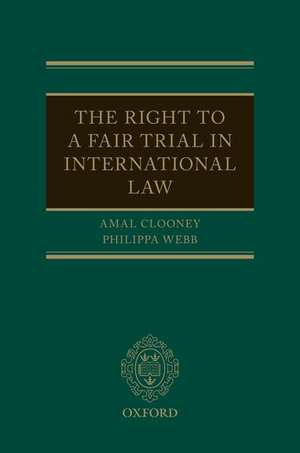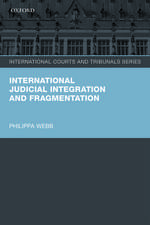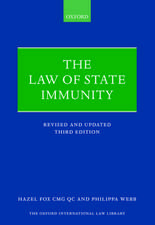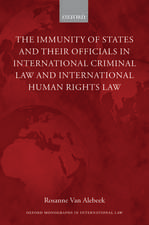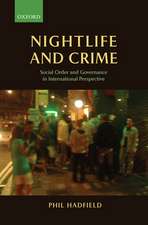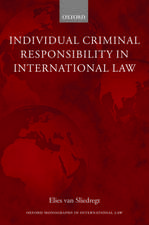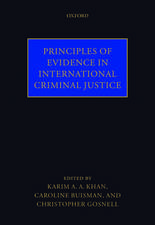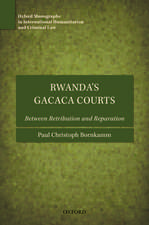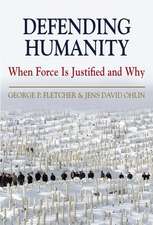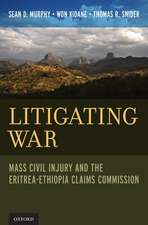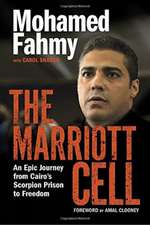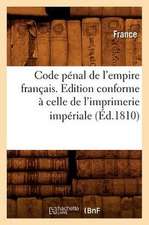The Right to a Fair Trial in International Law
Autor Amal Clooney, Philippa Webben Limba Engleză Hardback – 11 feb 2021
Preț: 1500.52 lei
Preț vechi: 2145.13 lei
-30% Nou
Puncte Express: 2251
Preț estimativ în valută:
287.12€ • 299.78$ • 237.63£
287.12€ • 299.78$ • 237.63£
Carte disponibilă
Livrare economică 04-10 martie
Preluare comenzi: 021 569.72.76
Specificații
ISBN-13: 9780198808398
ISBN-10: 0198808399
Pagini: 1056
Dimensiuni: 176 x 253 x 61 mm
Greutate: 1.93 kg
Editura: OUP OXFORD
Colecția OUP Oxford
Locul publicării:Oxford, United Kingdom
ISBN-10: 0198808399
Pagini: 1056
Dimensiuni: 176 x 253 x 61 mm
Greutate: 1.93 kg
Editura: OUP OXFORD
Colecția OUP Oxford
Locul publicării:Oxford, United Kingdom
Recenzii
Any case in which fair trial standards are in question should be one in which counsel are bringing to the court's attention the relevant international law that bears upon the points in issue. In compiling their tremendous book, Clooney and Webb have made this job much easier.
The book is very clearly written, and I congratulate the authors on an original and very useful contribution to legal literature, and its masterly exposition of exacting topics.
Together they are a powerhouse of an authorial team and have produced a book that combines an authoritative command of the legal subject matter with a keen, pragmatic sense of how it can be practically framed and employed before courts.
Its mastery of human rights sources matches its technical craftsmanship, and will make it an invaluable resource for practitioners.
The book will be an invaluable resource and stands to establish itself as the first port of call.
Cited by the UK Supreme Court in its judgment on the case R (on the application of TN (Vietnam)) (Appellant) v Secretary of State for the Home Department and another (Respondents)
This book makes the law on the right to a fair trial accessible. And accessible, not just to legal professionals representing those whose rights may have been infringed, but to potential victims too. The engaging, narrative style in which this book is written contributes to its success in meeting that aim ... There is no other way to say it: this is an absolute beast of a book. An enormously valuable resource that corrals the trees and allows the reader to see (and understand) the wood.
A formidable reference tool ... I cannot imagine any national criminal court that will not benefit greatly from having at least one copy in the library ... It will be an invaluable tool for practitioners on all sides of any trial. It will also be essential for judges at all stages of proceedings and academics and students.
This is a book that is very accessible. It is a working book that can be used by practitioners, but which is also written in a way that it is a joy to read.
I wish this book had been there when I was prosecuting at the ICTY.
It is a tour de force ... This book is not only relevant to those of us that have the pleasure and the privilege of appearing before different international courts, it is just as relevant perhaps even more so if one is in a military tribunal in far-flung places. This book is a very important resource in the backpack of any lawyer, domestic or international.
This is a must-read book for everyone in the field: judges, scholars, students, civil servants, NGOs and all over the world. The fundamental and basic requirement of an independent and impartial tribunal is becoming a serious concern in some states so this book is a precious resource.
I really wished I'd had this 10 years ago or 20 years ago in my career as defence counsel ... I'm sure that this book will be used for human rights cases for many years to come.
The real genius of this book I think is that it breaks down the silos between human rights law, domestic criminal procedures, international criminal law and even international humanitarian law. Too often scholars and practitioners in these fields are working essentially in acoustic isolation, but this book brings together the key principles and precedents all in one place and this will enable better cross-fertilisation between these systems and really contribute to the development of a holistic corpus of law devoted to fair trial protections ... It is the definitive work now on fair trial rights.
An outstanding book ... One can't believe it hasn't been written at some earlier junction in the form it has been presented to us by the authors ... It will be so useful to all the national human rights commissions because in its comprehensiveness it gives commissions an idea of how a state could manipulate trials procedurally to deny a defendant the fairness that they deserve. And it creates the basis by which a vigilance can be exercised.
This great work will sustain people around the world in their fight for justice.
The book is very clearly written, and I congratulate the authors on an original and very useful contribution to legal literature, and its masterly exposition of exacting topics.
Together they are a powerhouse of an authorial team and have produced a book that combines an authoritative command of the legal subject matter with a keen, pragmatic sense of how it can be practically framed and employed before courts.
Its mastery of human rights sources matches its technical craftsmanship, and will make it an invaluable resource for practitioners.
The book will be an invaluable resource and stands to establish itself as the first port of call.
Cited by the UK Supreme Court in its judgment on the case R (on the application of TN (Vietnam)) (Appellant) v Secretary of State for the Home Department and another (Respondents)
This book makes the law on the right to a fair trial accessible. And accessible, not just to legal professionals representing those whose rights may have been infringed, but to potential victims too. The engaging, narrative style in which this book is written contributes to its success in meeting that aim ... There is no other way to say it: this is an absolute beast of a book. An enormously valuable resource that corrals the trees and allows the reader to see (and understand) the wood.
A formidable reference tool ... I cannot imagine any national criminal court that will not benefit greatly from having at least one copy in the library ... It will be an invaluable tool for practitioners on all sides of any trial. It will also be essential for judges at all stages of proceedings and academics and students.
This is a book that is very accessible. It is a working book that can be used by practitioners, but which is also written in a way that it is a joy to read.
I wish this book had been there when I was prosecuting at the ICTY.
It is a tour de force ... This book is not only relevant to those of us that have the pleasure and the privilege of appearing before different international courts, it is just as relevant perhaps even more so if one is in a military tribunal in far-flung places. This book is a very important resource in the backpack of any lawyer, domestic or international.
This is a must-read book for everyone in the field: judges, scholars, students, civil servants, NGOs and all over the world. The fundamental and basic requirement of an independent and impartial tribunal is becoming a serious concern in some states so this book is a precious resource.
I really wished I'd had this 10 years ago or 20 years ago in my career as defence counsel ... I'm sure that this book will be used for human rights cases for many years to come.
The real genius of this book I think is that it breaks down the silos between human rights law, domestic criminal procedures, international criminal law and even international humanitarian law. Too often scholars and practitioners in these fields are working essentially in acoustic isolation, but this book brings together the key principles and precedents all in one place and this will enable better cross-fertilisation between these systems and really contribute to the development of a holistic corpus of law devoted to fair trial protections ... It is the definitive work now on fair trial rights.
An outstanding book ... One can't believe it hasn't been written at some earlier junction in the form it has been presented to us by the authors ... It will be so useful to all the national human rights commissions because in its comprehensiveness it gives commissions an idea of how a state could manipulate trials procedurally to deny a defendant the fairness that they deserve. And it creates the basis by which a vigilance can be exercised.
This great work will sustain people around the world in their fight for justice.
Notă biografică
Amal Clooney is a barrister who specialises in international law and human rights. She represents clients at courts including the International Criminal Court, the International Court of Justice and the European Court of Human Rights and specialises in cases involving political prisoners and victims of mass atrocities. She is appointed to the UK Attorney General's specialist Public International Law Panel of Counsel, the UK's team of experts on preventing sexual violence in conflict zones and is deputy chair of the High-Level Panel of Legal Experts on Media Freedom. She has also served as a senior advisor to Kofi Annan when he was the UN's Envoy on Syria and as Counsel to the UN Inquiry on the use of armed drones led by the Special Rapporteur on Counter-Terrorism and Human Rights. She is a Visiting Professor at Columbia Law School and co-founder of the Clooney Foundation for Justice.Philippa Webb is Professor of Public International Law at the Dickson Poon School of Law, King's College London and a barrister at Twenty Essex. She is a specialist in international law and advises governments, individuals, and corporations in cases before international and domestic courts, including the International Court of Justice, the European Court of Human Rights, and the Supreme Court of the United Kingdom. She is appointed to the UK Attorney General's specialist Public International Law Panel of Counsel. Professor Webb has served on the International Advisory Panel for the American Law Institute's project Restatement Fourth, Foreign Relations Law of the United States and the governing board of the European Society of International Law. She is on the editorial boards of the Journal of International Criminal Justice and the Leiden Journal of International Law.
